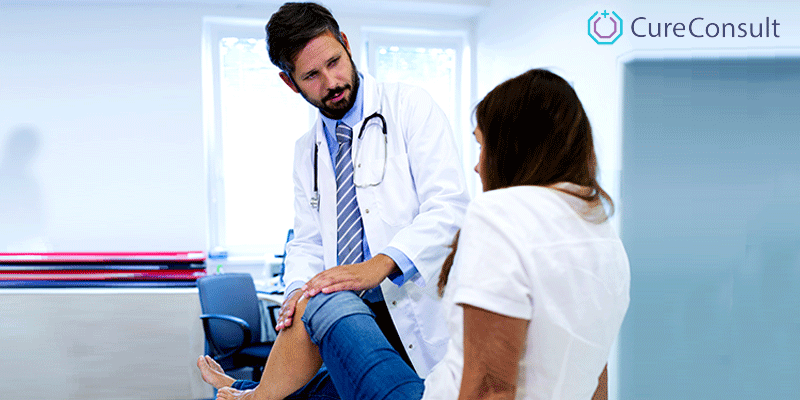Contents
It’s a universal fact that during pregnancy your body undergoes various physical changes. There can be hormonal changes leading to cravings, mood swings, and weight gain or loss. These changes are a part of the pregnancy cycle, and even after your delivery, your body may be susceptible to some unforeseen changes such as ligament injury, muscle soreness, and knee and joint pain. One of the grave challenges you could face among others is knee pain! If not given proper and timely attention it could lead to osteoporosis (thin and weak bones). CureConsult after several interactions with knee doctors and gynecologists has come up with ten reasons for knee pain after pregnancy.
Types of knee pain
Before delving deep into the reasons for knee pain, let’s understand about different types during pregnancy
-You may experience dull but constant pain in knees and joints which may occur due to ligament and soft tissue injury. Over time, the pain in the knee can get sharper and unbearable
-You may experience knee pain while standing, jogging or simply walking
-You may experience knee and joint pain while sitting or doing less aggressive exercises
Reasons for knee pain after Delivery
Weight Gain: Weight gain is a very common change in your body before and after pregnancy. Weight gain builds pressure on your knees and joints, causing knee and joint aches. Also, ankles and hips feel the weight of the body, leading to severe pain even after the delivery.
Excessive workout: Let’s accept the fact that during pregnancy you can’t do the same workouts that you were doing before getting pregnant considering the changes it undergoes. As the body changes your workouts and the level of workouts also change, and it takes time for your body to get back to normal after giving birth. Immediately, changing the level of workouts and doing higher reps can often lead to complications. Knee strengthening exercises like squats and lunges should be done in the right way without giving much pressure on the knees, as your knees and hips become vulnerable during and after pregnancy.
Relaxin Hormones: Pregnant ladies produce a hormone called Relaxin in their bodies. Although this hormone helps in preparing your pelvic muscles and tendons for pregnancy by stretching and relaxing them, it can also lead to contractions that may loosen your ligaments causing back pain and knee pain. Most knee specialists recommend gentle exercises and mild yoga to reduce pain.
Calcium and Vitamin D deficiency: Calcium and Vitamin D deficiency can cause bone tenderness, joint pain, osteoporosis(bone degeneration) and arthritis. It is a well-known fact that bone density drops when a woman starts breastfeeding after delivery. Low bone density can cause pain in knees and joints. Make sure there’s no deficiency of Calcium and Vitamin and consume a well-balanced diet to avoid bone degeneration and bone pain.
Injury: It can be the result of injuries like sprains and falls. These injuries can cause you extreme knee pain and joint pain. Make sure you take precautions while working out and doing household chores.
How to minimize knee pain after pregnancy?
Exercise: Regular and low impact exercises like walking and swimming can aid in keeping your joints flexible.
Eat healthy: Weight gain during pregnancy and deficiency of vitamin D and calcium can impact your knees and joints. Hence a balanced diet that is high in vitamin D and calcium is important for new moms with the risk of knee and arthritis.
Massage: Most of the knee specialists suggest massage therapy to reduce joint stiffness, joint pain, and knee pain. Regular massage can also help in improving the range of motion and walking.
Yoga: After pregnancy your body tremendous changes which cause lots of stress to most of the body parts- in the form of pain and sprain. If you have had a normal delivery then yoga is a good way to reduce the strain caused during pregnancy.
Acupuncture: Acupuncture is performed by inserting very thin needles into the body to reduce pain and trigger anti-inflammatory effects. One of the recent studies states that 18,000 patients found acupuncture to be effective for knee pain caused by osteoarthritis. Acupuncture also releases endogenous opioid endorphins (natural pain-relieving chemicals from the body) responsible for relieving body pain.
Frankincense oil: Frankincense, also known as olibanum is derived from the resin of the Boswellia tree. The Frankincense oil contains antioxidants and creates analgesic and anti-inflammatory effects which are beneficial in reducing inflammatory symptoms and alleviating knee pain. Adding 5-6 drops of pure frankincense oil and a carrier oil such as coconut oil and mustard oil, and gently massaging the affected area, 2-3 times a day for 5-10 minutes can help in reducing inflammation and pain.
Ginger: Ginger is known to have natural anti-inflammatory properties that aid in lessening the pain in the knees and joints. The antioxidants in ginger help in fighting the degeneration of joints. You need to boil two cups of water and then chopped ginger and Tumeric into it. Let it cool down for at least ten minutes and then have the ginger laced water with honey.
When to consult a knee doctor?
If knee pain is caused by any injury or enterovirus (also called the fifth disease) you should immediately book an appointment with your nearest knee specialist or doctor. It is the best way to reduce your knee pain and take necessary medication.
Choosing the best knee doctor in Bangalore for knee surgery can be daunting if you don’t know where to start. If you’re interested in a particular knee surgery or knee pain treatment, your knee surgeon and doctor should be open to discussing with you about the risks as well as outcomes of the surgery. If you need guidance in finding the best knee hospital in Bangalore, get in touch with our healthcare experts.
Still, have any questions? Get in touch with our expert team of healthcare counselors.

